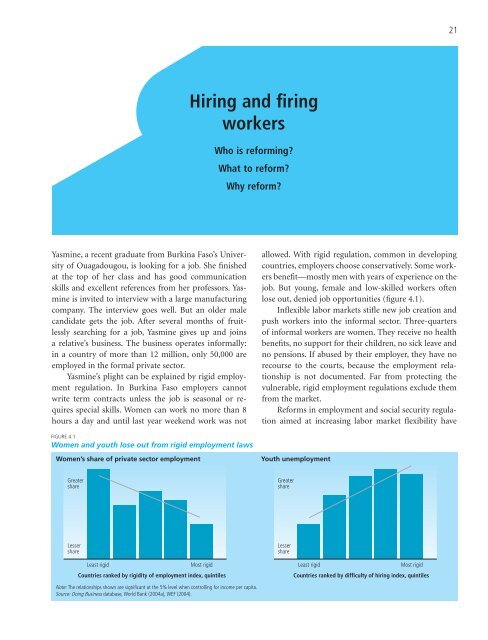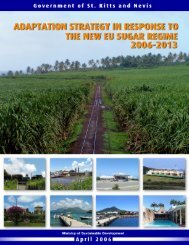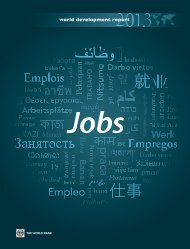Creating
Doing Business in 2006 -- Creating Jobs - Caribbean Elections
Doing Business in 2006 -- Creating Jobs - Caribbean Elections
Create successful ePaper yourself
Turn your PDF publications into a flip-book with our unique Google optimized e-Paper software.
21<br />
Hiring and firing<br />
workers<br />
Who is reforming?<br />
What to reform?<br />
Why reform?<br />
Yasmine, a recent graduate from Burkina Faso’s University<br />
of Ouagadougou, is looking for a job. She finished<br />
at the top of her class and has good communication<br />
skills and excellent references from her professors. Yasmine<br />
is invited to interview with a large manufacturing<br />
company. The interview goes well. But an older male<br />
candidate gets the job. After several months of fruitlessly<br />
searching for a job, Yasmine gives up and joins<br />
a relative’s business. The business operates informally:<br />
in a country of more than 12 million, only 50,000 are<br />
employed in the formal private sector.<br />
Yasmine’s plight can be explained by rigid employment<br />
regulation. In Burkina Faso employers cannot<br />
write term contracts unless the job is seasonal or requires<br />
special skills. Women can work no more than 8<br />
hours a day and until last year weekend work was not<br />
allowed. With rigid regulation, common in developing<br />
countries, employers choose conservatively. Some workers<br />
benefit—mostly men with years of experience on the<br />
job. But young, female and low-skilled workers often<br />
lose out, denied job opportunities (figure 4.1).<br />
Inflexible labor markets stifle new job creation and<br />
push workers into the informal sector. Three-quarters<br />
of informal workers are women. They receive no health<br />
benefits, no support for their children, no sick leave and<br />
no pensions. If abused by their employer, they have no<br />
recourse to the courts, because the employment relationship<br />
is not documented. Far from protecting the<br />
vulnerable, rigid employment regulations exclude them<br />
from the market.<br />
Reforms in employment and social security regulation<br />
aimed at increasing labor market flexibility have

















